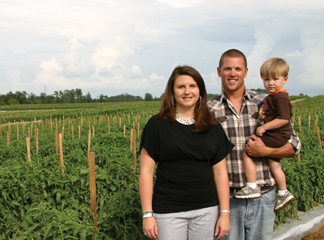OYFF Horticulture Winners: Life On The Vine: Tomatoes From The Mountain Are Cashes’ Crop

Growing up on Chandler Mountain, Brian Cash learned early about life on the vine.He learned that, when the soil surrenders its bounty of tomatoes each July through October, the mountaintop comes alive for another harvest season. And he learned that there’s nothing else he’d rather do.So when the opportunity arose to enter into a partnership with stepfather Kenneth Burton in K&B Farms, he jumped at the chance.”I just feel fortunate to get the chance,” said the 31-year-old, who along with wife Paige and son Corbin (2), won the Horticulture Division and are now finalists in the Alabama Farmers Federation’s Outstanding Young Farm Family contest. “My stepdad saw the drive I had and the love for it. You’ve got to love it to do it. Some don’t have the ‘want to’ or drive to do it.””I guess I’m the youngest generation coming up. There used to be a lot more of us than there is now,” he added, remembering the mountain’s heydays when it was known as ‘The Tomato Capital of Alabama.’ “I was one of the few that stuck with it, one of the few who didn’t mind the cheap labor until I could get a piece of the pie. Now, I can reap some of the benefits.”Of course, no one knows as well as he how difficult it can be to coax a living from the mountain. “Between Mother Nature and all of our tomatoes being grown in the summer, it’s tough and it’s expensive,” he says.Brian estimates it now costs $6,500 to $7,000 to grow just one acre of tomatoes — K&B has 70 acres, including 20 acres of Roma tomatoes and five acres of grape tomatoes.”Every year the cost is going up,” he says, noting that a commonly used fumigant costs $900 per acre.The cost of the plastic sheeting that covers the rows and dresses the fields in a silvery space suit also continues to climb each season, but Brian can’t imagine growing tomatoes without it.Last year, K&B’s fields yielded 2,900 25-pound boxes per acre, a staggering 72,500 pounds. “We picked 192,000 boxes at 25 pounds (4.8 million pounds). That’s a lot for the amount of acreage we’ve got,” he says proudly. “Yielding 3,000 per acre is well above average. As of now, we’re hitting that again.”With about 40 migrant workers picking about 3,200 boxes per day, the tomatoes are sorted and packed at their own packing house and shipped by truck to Florida and all along the East Coast with a large portion going to Philadelphia.”When the market’s good, like it is now, we have trucks backed up here, and we never put them into the cooler,” Brian says. “We just put them straight on the truck. We ship within two days. We’re loading, on average, two trailer trucks a day – about 1,600 boxes on a trailer truck.”To ensure that those trucks keep rolling with boxes of tomatoes, K&B recently underwent a rigid food safety certification process by Primus Labs. It took months of work and about $10,000 for portable wash stations for its workers and fencing off its fields, but K&B passed the test.”It opens up more opportunities for us,” says Brian. “It was all voluntary. We didn’t have to do this. As long as the price is good, buyers will never even ask. They don’t care if you’re certified — they just want your tomatoes. But when tomatoes get cheap — that’s when it matters. They’ll buy our tomatoes before they’ll go to other places to buy them because we took that extra step.”Paige, a self-described “city girl” from Attalla who says she didn’t even know tomato farms covered Chandler Mountain until she and Brian met, handles the financial end of the operation, including the accounting and payroll. That’s in addition to her other full-time job as a teacher.”It’s an interesting process,” she said of the operation. “There’s a lot more that goes into it than I ever thought.”Plus, she’s discovered something else about tomato farming on Chandler Mountain, something her husband learned long ago. And that is life on the vine is sweet.”It’s a great family business, very family oriented,” she says. “A lot of hard work goes into it, but most of the time, it’s very rewarding. Raising a child on the farm is going to be one of the best things. Just instilling that love of nature, and growing up to work for what you have, but it’s a good living.”
